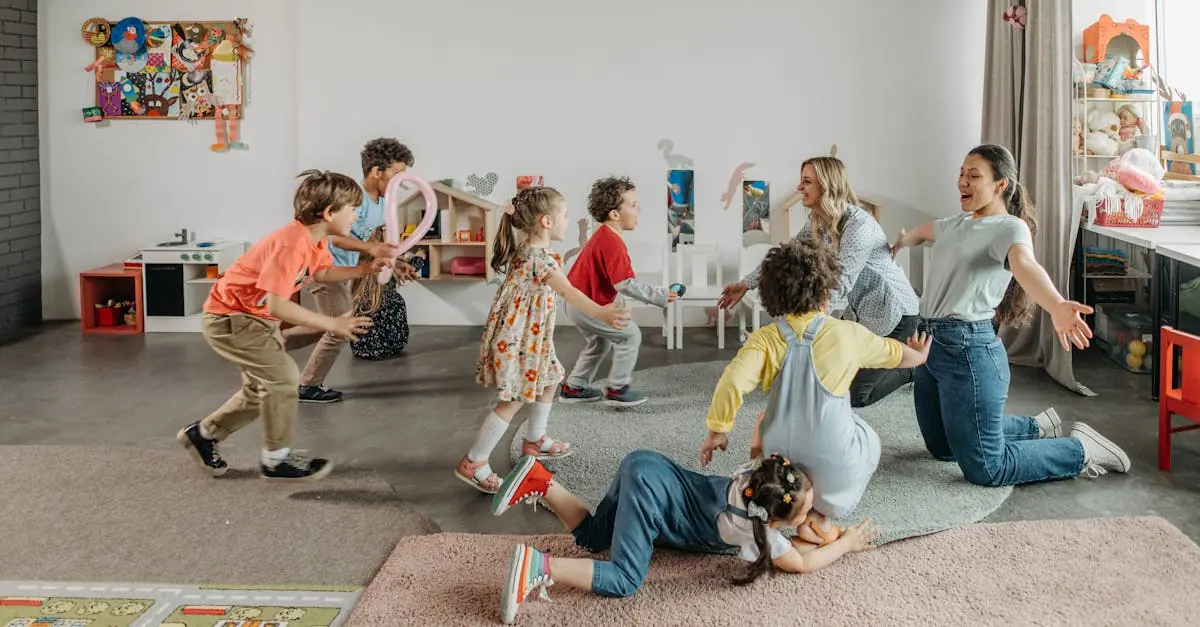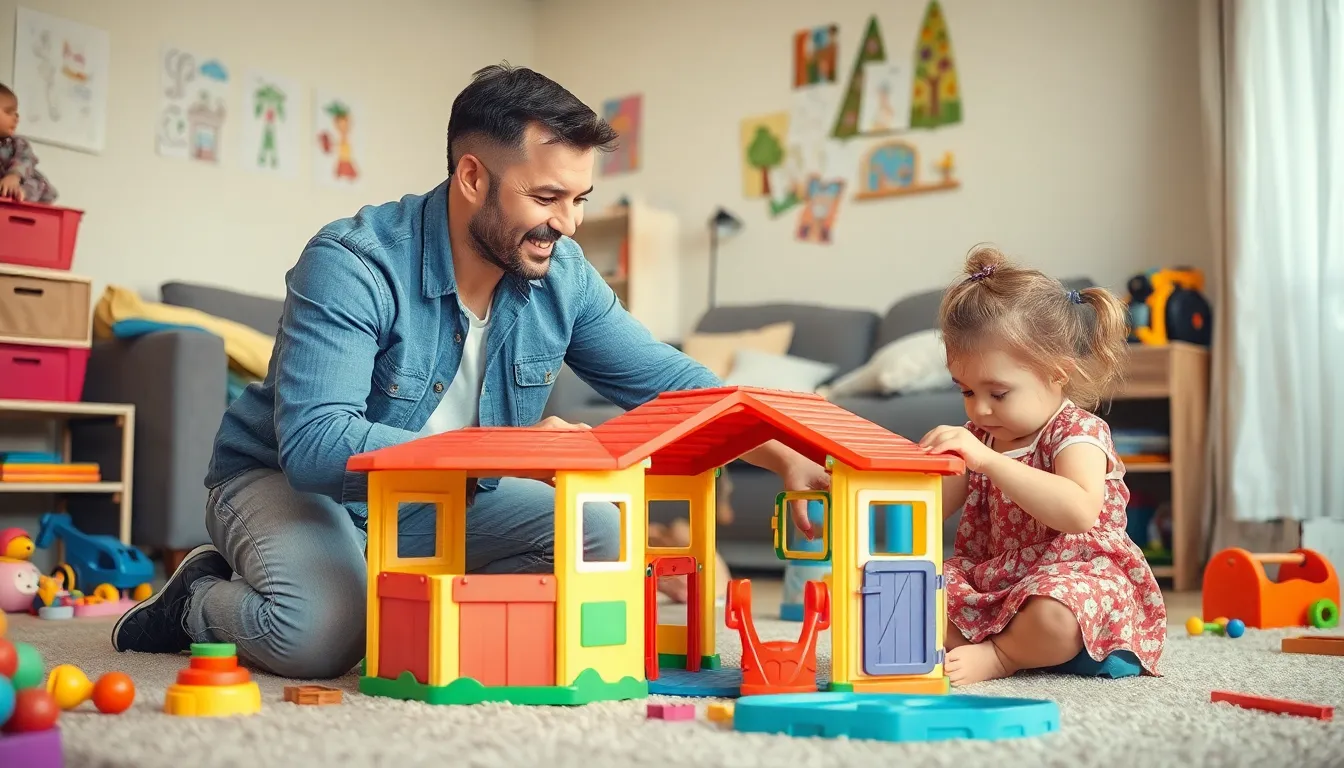In a world where swiping right is the new handshake, developing social skills has never been more crucial. Whether it’s chatting up a colleague at the water cooler or making small talk with that neighbor who seems to have an endless supply of lawn gnomes, mastering the art of conversation can open doors to endless opportunities.
Table of Contents
ToggleImportance Of Developing Social Skills
Developing social skills remains crucial in enhancing personal and professional interactions. Effective communication fosters strong relationships, enabling individuals to connect meaningfully with others. Relationships often thrive on the ability to express thoughts clearly and listen actively, facilitating mutual understanding.
Conflict resolution skills contribute significantly to personal growth. Individuals who navigate disagreements diplomatically cultivate resilience and empathy. These attributes strengthen interactions in various social scenarios, whether at home or in the workplace.
Networking opportunities arise from refined social skills, with research indicating that approximately 70% of job placements stem from personal connections. Important connections often lead to career advancements through recommendations and collaborations.
Engagement in group activities plays a vital role in social skill development. Team settings, such as clubs or sports teams, practice cooperation and communication. Participants learn to share ideas, demonstrate respect, and establish trust among peers.
Social skills also enhance emotional intelligence. Ability to understand and manage emotions influences how individuals perceive others’ feelings. Higher emotional intelligence correlates with improved relationships, paving the way for fruitful interactions.
Adaptability in social settings forms another key aspect. Flexibility in conversations allows individuals to adjust to varying topics and audiences. Capability to pick up social cues and respond appropriately leads to more engaging dialogues.
Lastly, developing social skills contributes to overall mental well-being. Positive interactions foster a sense of belonging, reduce anxiety, and build self-esteem. A supportive network promotes happiness and resilience in navigating life’s challenges.
Key Components Of Social Skills
Developing social skills involves several critical components that enhance interactions. Two of the most important are communication skills and emotional intelligence.
Communication Skills
Effective communication plays a vital role in social interactions. Clarity in speech ensures messages get across accurately and effectively. Listening actively promotes understanding and shows respect for others’ viewpoints. Nonverbal cues, including body language and eye contact, significantly influence how messages are received. Engaging in conversations regularly helps refine these skills. Practicing with diverse groups enhances adaptability, fostering smoother exchanges. Studies show that up to 70% of job opportunities arise through effective networking, underscoring the need for strong communication abilities in both personal and professional settings.
Emotional Intelligence
Emotional intelligence involves recognizing and managing one’s emotions and the emotions of others. Individuals with high emotional intelligence demonstrate empathy, allowing them to connect on a deeper level. Understanding emotional cues enhances responses in various social situations. Navigating conflicts becomes easier when one can identify feelings and demonstrate compassion. Emotional intelligence also contributes to building trust and cultivating relationships. Cultivating these skills leads to improved self-esteem and overall mental well-being. Engaging with social groups fosters emotional connections, promoting happiness and resilience in daily life.
Techniques For Developing Social Skills
Effective techniques enhance social skills in various contexts. Practicing these methods can lead to improved interactions and stronger relationships.
Active Listening
Active listening forms the foundation of strong communication. Engaging in conversations requires undivided attention to the speaker. It involves nodding, maintaining eye contact, and providing verbal affirmations like “I see” or “That makes sense.” This approach encourages speakers to express themselves fully. Asking open-ended questions fosters deeper discussions and demonstrates genuine interest. Rejecting distractions, such as phones, allows for more meaningful exchanges. Research shows that active listeners tend to build more robust connections, as they understand nuances in conversations. Those practicing active listening develop empathy and improve their emotional intelligence over time.
Empathy Development
Empathy significantly enhances social interactions. Cultivating this skill begins with recognizing others’ emotions. Observing body language and facial expressions allows individuals to gauge feelings accurately. Individuals can strengthen their empathetic abilities by imagining themselves in another’s position. Sharing personal experiences fosters mutual understanding and promotes trust. Moreover, discussing feelings in a non-judgmental manner creates a safe space for transparency. Participating in community service exposes individuals to diverse perspectives and situations, further enhancing empathy development. Studies indicate that improved empathy correlates with better conflict resolution skills and stronger interpersonal relationships.
Social Skills Activities
Engaging in social skills activities fosters effective communication and emotional intelligence. These activities can take many forms, each aimed at enhancing interpersonal abilities. Group discussions provide a platform for participants to practice active listening and share opinions. Role-playing scenarios serve to simulate real-life interactions, allowing individuals to navigate various social situations.
Joining clubs creates opportunities for collaboration and teamwork. Activities in clubs can include book discussions, sports, or volunteer projects, each requiring members to communicate and connect. Participating in community service enhances empathy, exposing individuals to diverse perspectives while requiring cooperation with others. This shared experience can deepen emotional understanding among participants.
Taking part in improv classes offers a fun way to improve spontaneity in conversations. Improvisational exercises challenge individuals to respond quickly and creatively, building adaptability in social exchanges. Engaging in team-building exercises promotes trust and collaboration among participants, further strengthening social bonds.
Attending workshops focused on public speaking equips individuals with essential communication skills. These settings encourage practice in presenting ideas clearly and confidently, which promotes effective expression. Joining discussion groups or taking classes that focus on specific interests can build rapport with like-minded individuals, enhancing connections through shared passions.
Online forums and social media platforms also present modern avenues for developing social skills. Engaging in thoughtful conversations online cultivates effective communication, even in virtual environments. Through these activities, individuals can simultaneously practice their skills and expand their networks, maximizing personal and professional growth.
Overcoming Common Challenges
Overcoming challenges in developing social skills involves addressing fears and anxieties. Individuals might feel nervous during social interactions or worry about making mistakes. Recognizing these feelings forms the first step toward improvement.
Building confidence in conversation takes practice. Engaging in interviews or networking events provides direct experiences that enhance communication. Practicing speaking in front of small groups helps ease the discomfort that often accompanies public speaking.
Navigating misunderstandings can present difficulties in social settings. Miscommunication may arise from unclear expressions or tone. Asking clarifying questions promotes mutual understanding and resolves confusion, preventing conflicts.
Adopting a growth mindset encourages individuals to view social interactions as opportunities for learning. Embracing mistakes as valuable lessons paves the way for growth and adjustment in future conversations. Individuals learn from each experience, refining their skills gradually.
Maintaining empathy contributes to overcoming challenges in social interactions. Acknowledging others’ feelings and perspectives fosters connection and understanding. Responding thoughtfully strengthens interpersonal relationships, making communication less daunting.
Managing rejection also plays a crucial role in developing social skills. Fear of rejection can hinder participation in group activities. Recognizing that everyone experiences rejection allows individuals to approach social situations with resilience and optimism.
Finding support within one’s network aids in overcoming social challenges. Joining workshops or practicing with friends cultivates a safe environment for skill development. Constructive feedback from trusted peers can enhance confidence and effectiveness in communication.
Emphasizing consistent practice reinforces social skill development. Engaging regularly with diverse groups offers numerous opportunities to apply learned techniques. Gradual exposure to various situations leads to more adept interpersonal abilities.
Conclusion
Developing social skills is essential in today’s interconnected world. By honing these abilities, individuals can build stronger relationships and create valuable opportunities. Regular practice and engagement in diverse social settings not only enhances communication but also boosts emotional intelligence.
Overcoming challenges in social interactions requires a proactive approach. Embracing a growth mindset allows individuals to learn from experiences and build resilience. With consistent effort and support from their networks, anyone can refine their social skills.
Ultimately, investing in social skill development leads to improved mental well-being and a greater sense of belonging. As individuals navigate their personal and professional lives, these skills become invaluable assets, fostering connections that enrich their experiences.







